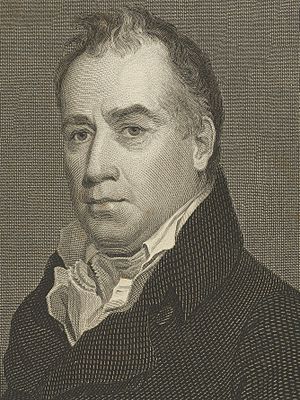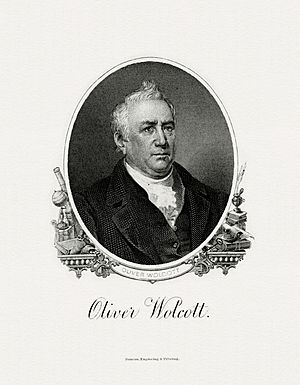Oliver Wolcott Jr. facts for kids
Quick facts for kids
Oliver Wolcott Jr.
|
|
|---|---|
 |
|
| 24th Governor of Connecticut | |
| In office May 8, 1817 – May 2, 1827 |
|
| Lieutenant | Jonathan Ingersoll David Plant |
| Preceded by | John Cotton Smith |
| Succeeded by | Gideon Tomlinson |
| Judge of the United States Circuit Court for the Second Circuit | |
| In office February 20, 1801 – July 1, 1802 |
|
| Appointed by | John Adams |
| Preceded by | Seat established by 2 Stat. 89 |
| Succeeded by | Seat abolished |
| 2nd United States Secretary of the Treasury | |
| In office February 3, 1795 – December 31, 1800 |
|
| President | George Washington John Adams |
| Preceded by | Alexander Hamilton |
| Succeeded by | Samuel Dexter |
| Personal details | |
| Born |
Oliver Wolcott Jr.
January 11, 1760 Litchfield, Connecticut Colony, British America |
| Died | June 1, 1833 (aged 73) New York City, New York, U.S. |
| Political party | Federalist (Before 1816) Toleration (1816-1827) Jacksonian (1827-1829) |
| Parent |
|
| Relatives | Roger Wolcott |
| Education | Yale University read law |
| Signature | |
Oliver Wolcott Jr. (born January 11, 1760 – died June 1, 1833) was an important American politician and judge. He served as the second United States Secretary of the Treasury, a judge, and the 24th Governor of Connecticut. His career started in Connecticut, then moved to the U.S. federal government, and later he returned to Connecticut. Oliver Wolcott Jr. was the son of Oliver Wolcott Sr., who was also a famous politician.
Contents
Early Life and Education
Oliver Wolcott Jr. was born on January 11, 1760, in Litchfield, which was then part of British America. He joined the Continental Army during the American Revolutionary War from 1777 to 1779. After his military service, he graduated from Yale University in 1778. He also studied law, which means he learned to be a lawyer.
His family, the Wolcotts, were part of a powerful group in Connecticut called the "Standing Order." This group included elite families who had a lot of influence in politics, religion, and society. However, Oliver Wolcott Jr. developed his own ideas. He believed in including more people in Connecticut's government, which was different from the traditional views of the Standing Order.
Career Highlights
Early Government Roles
From 1781 to 1782, Wolcott worked for the Connecticut Committee on Pay-Table. This group was in charge of keeping track of Connecticut's military spending during the American Revolution. He was a member of this committee from 1782 to 1784.
Wolcott also helped settle financial claims for Connecticut against the United States from 1784 to 1788. He then became the Comptroller of Public Accounts for Connecticut from 1788 to 1789. A comptroller is someone who manages financial records. He continued this work for the United States Department of the Treasury as an Auditor from 1789 to 1791, and then as Comptroller from 1791 to 1795.
Secretary of the Treasury
In 1795, President George Washington chose Wolcott to be the 2nd Secretary of the Treasury. This was a very important job, as he was in charge of the country's money. Before this, he had worked closely with the first Secretary of the Treasury, Alexander Hamilton. Wolcott's loyalty to Hamilton helped him get promoted.
As Secretary, Wolcott was responsible for managing the nation's finances. He also played a big role in getting money to pay for the Quasi-War with France, which happened between 1798 and 1800.
Federal Judge
President John Adams nominated Wolcott to be a judge for the United States Circuit Court for the Second Circuit. He became a judge on February 20, 1801. However, his time as a judge was short because the court was closed down on July 1, 1802.
Governor of Connecticut
After his federal career, Wolcott became a farmer for a short time. In April 1817, he was elected as the 24th Governor of Connecticut. He was the third person from the Wolcott family to hold this position, following his father and grandfather.
As governor, Oliver Wolcott Jr. was known for his balanced views. He focused on what was best for Connecticut, rather than getting caught up in political fights. In 1818, he led the group that wrote a new constitution for Connecticut. This new constitution brought many changes, such as:
- Improving laws for manufacturing.
- Lowering taxes for citizens.
- Making prisons better.
- Allowing more white men to vote.
- Giving people religious freedom from the main church at the time.
Death and Legacy
Oliver Wolcott Jr. passed away on June 1, 1833, in New York City. He was the last surviving person who had served in President Washington's cabinet.
The town of Wolcott, Connecticut, was named in honor of both Oliver Wolcott Jr. and his father, Oliver Wolcott Sr.
Images for kids
See also
 In Spanish: Oliver Wolcott, Jr. para niños
In Spanish: Oliver Wolcott, Jr. para niños
 | Mary Eliza Mahoney |
 | Susie King Taylor |
 | Ida Gray |
 | Eliza Ann Grier |


